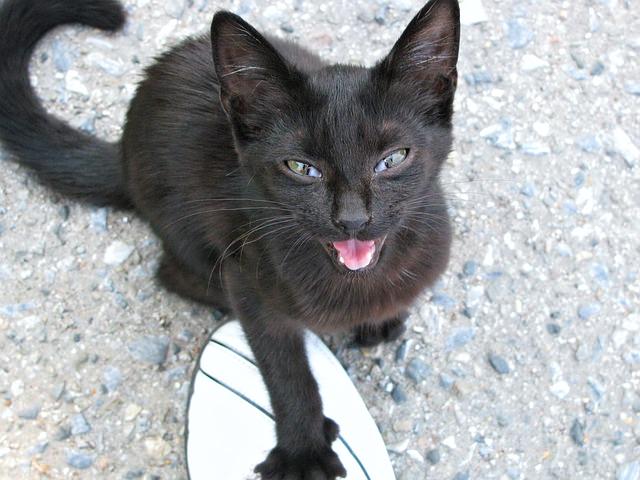You just went into the bedroom or bathroom and you shut the door behind you. Your cat was following along behind you (see Why Does My Cat Follow Me To The Bathroom?) and you inadvertently excluded him. He is now outside yowling like there’s not tomorrow. Why is he doing that?
The noises that cats make are certainly forms of communication, but it is interesting to learn that adult cats seldom communicate with other adult cats vocally. In fact, they seem to use their voices mostly in their communication with their kittens and their humans. The sounds cats make are means to express needs, physical or emotional. Sometimes our cats will meow sweetly, and sometimes they bear down and yowl! A yowl is a prolonged and sometimes soulful cry meant to communicate something specific and more intense than the usual sounds.
Yowling plaintively seems to be reserved for human ears and sometimes kittens will yowl for their mothers and seem to imply a more urgent need. Cats will often yowl when they desire instant gratification. For example, if you are not responding to your cat, she has to ramp up the cry. Cats can yowl at doors if the door is closed and they want to be on the other side, or if they are confined. Some cats that have not been adequately carrier-trained will yowl in the carrier on road trips. This kind of yowling is a sign of stress.
A yowl always indicates stronger emotion than a meow or mew. There is even an aggressive yowl when a cat feels cornered. You can distinguish between the yowls if you take into account the other signals your cat gives. In the bathroom door scenario, your cat feels left out and is communicating that he wants a different outcome. Cats that yowl whenever they are confined are indicating that they want a different outcome and they are stressed. Cats that yowl defensively are extremely stressed and the yowl illustrates it, but also serves as a warning to the source of the stress or perceived threat. Some cats yowl when they are in pain. For example, cats with urinary pain may yowl when they are in the litter box because of painful urination.
If you notice that your cat is yowling, assess the situation. Is she in danger, pain, or just not getting her way? You will want to do what you can to address all the possible causes, whatever they may be. Even if your cat is just being spoiled, you should address that too. Open that bathroom door! Don’t you know that you are lucky she lets you live there?
Do you love cats and want to learn all about them? Like me on Facebook (click here) to see my articles, pictures and animal fun!



